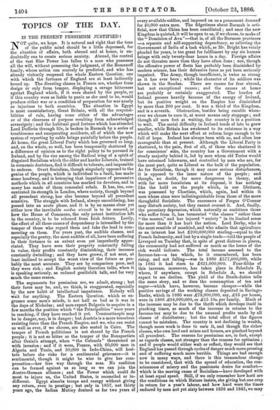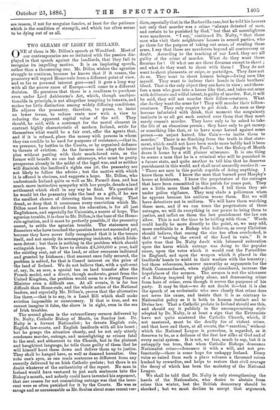TOPICS OF THE DAY.
IS THE PRESENT PESSIMISM JUSTIFIED ?
NOT quite, we hope. It is natural and right that the tone of the public mind should be a little depressed, for the situation of affairs, both abroad and at home, is un- doubtedly one to create serious anxiety. Abroad, the control of the vast Slav Power has fallen to a man who possesses all the will, without possessing the judgment, of the Romanoff family, whose action can scarcely be predicted, and who has already violently reopened the whole Eastern Question, one with which the fortunes of England are at least indirectly bound up. The directing classes in France are, whether from design or only from temper, displaying a savage bitterness against England which, if it were shared by the people, or if this country were as liable to panic as she used to be, would produce either war or a condition of preparation for war nearly as injurious to both countries. The situation in Egypt is most unsatisfactory, Great Britain, with all the responsi- bilities of rule, having none either of the advantages or of the clearness of purpose resulting from acknowledged sovereignty ; and the habitual good fortune which has attended Lord Dufferin through life, is broken in Burmah by a series of troublesome and exasperating accidents, all of which the new system of reporting by cable brings painfully before the people. At home, the great Liberal Party which has governed so long, and, on the whole, so well, has been temporarily shattered by a difference of opinion as to the right policy to be pursued in Ireland, and by the rise among the Radical wing of a spirit of disguised Socialism which the older and harder Liberals, trained in economic doctrines, find it difficult to tolerate, and impossible to endorse. Overt Socialism, though singularly opposed to the genius of the people, which is individual to a fault, has made some headway, and is betraying that impatience of persuasive methods which in all countries has marked its devotees, and in many has made of them concealed rebels. It has, too, con- centrated its strength in London, where society, though beyond all precedent strong, has also become beyond all precedent sensitive. The struggle with Ireland, always smouldering, has passed into an acute phase, and it is by no means clear yet either how the inevitable modes virendi is to be secured, or how the House of Commons, the only potent institution leTt in the country, is to be released from Irish fetters. Lastly, the effect of all these causes of despondency is intensified by the temper of those who regard them and take the lead in com- menting on them. For years past, the audible classes, and especially the gentry, the most audible of all, have been suffering in their fortunes to an extent even yet imperfectly appre- ciated. They have seen their property constantly falling in value, their profits constantly diminishing, their incomes constantly dwindling ; and they have grown, if not sour, at least inclined to accept the worst view of the future as pro- bably the most accurate. They are by comparison poor, and they were rich ; and English society therefore talks, when it is speaking seriously, as reduced gentlefolk talk, and for very much the same reason.
The arguments for pessimism are, we admit, strong ; but their force may be, and, we think, is exaggerated, especially by the new habit of intellectual impatience. Nobody will wait for anything. The Eastern Question, which so en- grosses some men's minds, is not half as bad as it was in the days of Nicholas ; and men expect Bulgaria to acquire in a few months the position which " the Principalities " were years in reaching, if they have reached it yet. Constantinople may be in danger, nay, is in danger ; but Austria is a more tenacious resisting force than the French Empire, and we, who can resist as well as ever, if we choose, are also seated in Cairo. The temper of French politicians is not shared by the French people ; it is not so bitter as the temper of the Bonapartists after Orsini's attempt, when " the Colonels " threatened us with invasion ; and if it were, France, with 60,000 men in Algeria and Tunis, and 30,000 in Indo-China, will hesi- tate before she risks for a sentimental grievance—it is sentimental, though it might be wise to give her com- pensation—her free way through the seas. No coalition can be formed against us so long as we can join the Austro-German alliance ; and the Power which could do most to injure us, the United States, is reconciled or in- different. Egypt absorbs troops and energy without giving any return, even in prestige ; but only in 1857, not thirty years ago, the Indian Mutiny drained us for two years of every available soldier, and imposed on us a permanent demand for 40,000 extra men. The fidgetiness about Burmah is arti- ficial, now that China has been conciliated ; and once the new- Kingdom is quieted, it will be open to us, if we choose, to make cf the " Dominion of Ave "—that is, of all the Burmese provinces —a separate and self-supporting dependency, so relieving the Government of India of a task which, as Mr. Bright has vainly pleaded for years, is too great for fulfilment by any six human beings with only twenty-four hours in a day. Foreign affairs do not threaten more than they have often done ; nor, though the offensive power of fleets has probably been diminished by modern science, has their defensive force as yet been seriously impaired. The Army, though insufficient, is twice as strong as it has ever been ; while the character of its soldiers was shown in the Soudan. There are causes for fear abroad, but not exceptional causes ; and the causes at home are probably or certainly exaggerated. The burden of Ireland presses heavily because of the energy of Ireland, but its positive weight on the Empire has diminished by more than 200 per cent. It was a third of the Kingdom, and is a seventh. Obstruction, besides being curable when- ever we choose to cure it, at worst means only stoppage ; and though all men fret at waiting, the country is in a position to wait. The social difficulty in Ireland tends of late to grow smaller, while Britain has awakened to its existence in a way which will make the next effort at reform large enough to be full of hope. Ireland has always been with us, and often less manageable than at present. Although the Liberal Party is shattered, to the pain, first of all, of those who shattered it for conscience' sake, the country has a Government with a steady majority behind it, led by men whom old Tories would have esteemed lukewarm, and controlled by men who are, for the most part, quite as Liberal as the bulk of the population. As for Socialism, though it may cause serious disturbances, it is opposed to the inner nature of the people ; and though, no doubt, far more dangerous in theory, and with far more fanaticism at its disposal, it has nothing like the hold on the people which, in our lifetimes, was possessed by Chartism, which, again, had within it men whose aims were indistinguishable from those of the more thoughtful Socialists. The successors of Fergus O'Connor may disturb society, but they cannot overset it. And, finally, the pecuniary depression, which naturally so embitters those who suffer from it, has tormented " the classes " rather than "the masses," and has injured " society" in its limited sense far more than it has hurt the nation. Lord Derby, who is the most sensible of mankind, and who admits that agriculture as an interest has lost £200,000,000 sterling—equal to the French Indemnity, and lost by a single trade—told the people of Liverpool on Tuesday that, in spite of great distress in places, the community had not suffered as much as the losses of the rich would indicate. The total income assessed to the Income-tax—a tax which, be it remembered, has been rising, and not falling—was in 1880 £577,000,000, while in 1885 it had risen to £631,000,000. Four-fifths of this increase, moreover, has taken place in Schedule D, where, if anywhere, except in Schedule A, we should expect to see decline. The yield of the Death-duties tells the same story, and so does the consumption of tea and sugar—which have, however, become cheaper—while the positive savings of the working classes deposited in Savings.. Banks, which in 1880 were £78,000,000, say, £13 per house, were in 1886 £94,000,000, or £15 10s. per family. Much of the increase may be due to the thrift which develops itself in pinching times, as much of the increase in returns to the Income-tax may be due to the unusual profits made by all classes of distributors ; but the total effect of the figures cannot be mistaken. The country is not declining in wealth, though more work is done to earn it, and though the richer classes, who own land and mines and houses, are pinched beyond all precedent. The reasons for pessimism are, in fact, except as regards classes, not stronger than the reasons for optimism ; and if people would either wait or reflect, they would see that England has passed through cycles of danger much more pressing and of suffering much more terrible. Things are bad enough now in many ways, and there is this tremendous change to be considered, that with the spread of education, the con- sciousness of misery and the passionate desire for comfort— which is the moving cause of Socialism—have developed with at least equal speed. Still, if we only remember how hard are the conditions on which Nature insists, she giving but one crop in return for a year's labour, and how hard were the times endured by men not yet sixty between 1838 and 1845, we may see reason, if not for sanguine fancies, at least for the patience which is the condition of strength, and which too often seems to be dying out of us all.



































 Previous page
Previous page